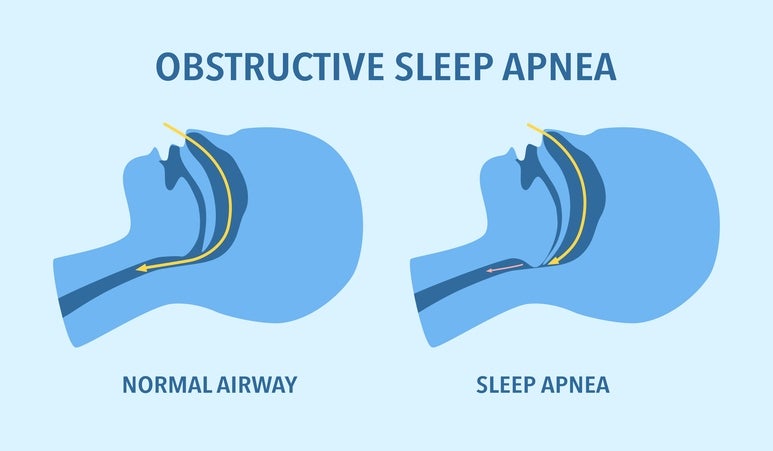Is Sleep Apnea the Only Cause of Loud Snoring?
Loud snoring can annoy anyone who shares a room with a noisy sleeper. But beyond just being disruptive, snoring can sometimes be an indicator of underlying health issues. While many people associate loud snoring exclusively with sleep apnea, the truth is that other factors can contribute as well. From nasal congestion to allergies and even poor sleep habits, various conditions could be the cause. Understanding these potential contributors can help you recognize when intervention is needed.

Below, the ENT providers at SoCal Breathe Free Sinus & Allergy Centers San Diego discuss the connection between loud snoring and sleep apnea for patients throughout San Diego, CA and the surrounding areas, including Burbank. Sleep apnea doesn’t have to control your life or sleep patterns. Reach out to our friendly team today to learn more about our advanced sinus and allergy treatments.
Understanding Sleep Apnea Symptoms: When to Be Concerned
Not all snoring is created equal. Occasional, mild snoring is common and usually not a reason to panic, but loud and persistent snoring can signal a more serious issue. If your snoring is accompanied by signs like choking, gasping for breath, or pauses in breathing during sleep, it’s time to seek medical advice. Another red flag is extreme fatigue or sleepiness during the daytime, which could indicate that your sleep is being disrupted.
Even if snoring isn’t due to a serious condition, it can still negatively impact your quality of rest, leaving you tired and irritable. Chronic loud snoring should never be ignored, as uncovering the cause can improve your sleep and overall health.
What Is Sleep Apnea & What Causes Sleep Apnea?
Do people with sleep apnea snore? Sleep apnea is one of the most well-known and serious causes of snoring. It occurs when your airway becomes partially or completely blocked during sleep, leading to pauses in breathing. These interruptions often result in loud snoring as the body works harder to pull air through a narrowed airway. There are two main types of sleep apnea. Obstructive sleep apnea (OSA) happens when the throat muscles relax and block airflow, while central sleep apnea (CSA) occurs when the brain doesn’t send proper signals to the muscles controlling breathing. Loud snoring and other symptoms like gasping for breath or frequent waking are hallmarks of OSA.

If you suspect sleep apnea is causing your snoring, consult a healthcare provider. Left untreated, the signs of sleep apnea can lead to complications like high blood pressure, heart disease, and diabetes. Treatment options, such as using a CPAP (continuous positive airway pressure) machine or making lifestyle changes, can significantly improve your sleep quality and health.
Nasal Congestion & Sinus Issues
Nasal congestion and sinus problems are another common cause of loud snoring. Airflow becomes restricted when your nasal passages are blocked due to a cold, the flu, or sinus infections. This forces you to breathe through your mouth, leading to vibrations in the airway that produce snoring.
Deviated septums, where the nasal cavity is off-center, can also restrict airflow and amplify snoring. Similarly, polyps or growths in the nasal passages can contribute. If nasal congestion or sinus issues are a recurring problem, medications like decongestants, nasal sprays, or even surgery in severe cases may help alleviate the cause—and, by extension, the snoring.
Impact of Poor Sleep Hygiene on Snoring
Poor sleep hygiene could be contributing to excessive snoring and poor airflow during sleep. Irregular sleep schedules, excessive screen time before bed, and consuming alcohol or heavy meals late at night can all negatively affect the quality of rest and relaxation in the throat muscles. Beyond that, lack of sleep and increased fatigue can relax the airway tissues, which may make snoring even worse.
To curb these nightly breathing issues, avoid sleeping on your back and try sleeping on your side instead. This helps keep airways open. You’ll also want to establish a consistent bedtime routine that involves using a humidifier, breathing strips, or saline spray. Even your pillow position can help reduce snoring. Slightly elevating your head with a supportive pillow can sometimes prevent airway obstruction.
How Allergies Can Worsen Snoring
Seasonal or year-round allergic conditions can significantly aggravate snoring. Allergies like hay fever can cause inflammation in the nasal passages and throat, making it harder to breathe through your nose. The resulting restricted airways can lead to mouth breathing, which produces noisier snoring.
Dust mites, pet dander, and other allergens in your sleeping environment can worsen matters. If you’re an allergy sufferer, addressing the root cause is essential. Using an air purifier, frequently washing bedding, and ensuring your home is free of allergens can ease nasal congestion and reduce snoring.
Contact Our Team Today to Learn More
While sleep apnea is often linked to loud snoring, it’s far from the only cause. Nasal congestion, sinus issues, allergies, and lifestyle factors like poor sleep hygiene or alcohol consumption can all play a role. Identifying the underlying cause of your snoring is key to finding a solution that works for you. If your snoring is loud, persistent, or accompanied by other symptoms, consult a healthcare professional to rule out severe conditions like sleep apnea.
Reach out to the ENT providers at SoCal Breathe Free Sinus & Allergy Centers San Diego if you’re ready to learn about your options for sleep apnea treatments or schedule an appointment online to get started. We’re happy to help residents throughout San Diego, CA and the surrounding areas, including Burbank.
The information provided in this article is for informational and educational purposes only and does not constitute medical advice. It is not intended to diagnose, treat, cure, or prevent any disease or medical condition. Always seek the guidance of your physician or other qualified healthcare provider with any questions you may have regarding a medical condition or treatment.
Results may vary: Treatment outcomes and health experiences may differ based on individual medical history, condition severity, and response to care.
Emergency Notice: If you are experiencing a medical emergency, call 911 or seek immediate medical attention.
